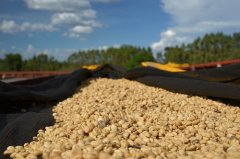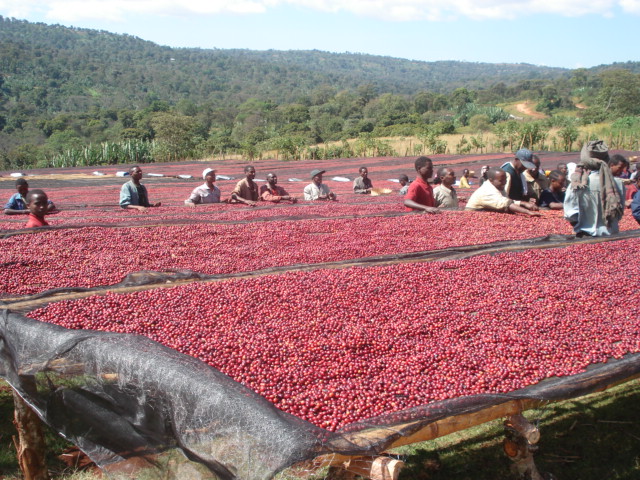China Coffee Network Ethiopia 90+levelupDerar Ela Dre Ella / Hua Yu Sun Xida
Ethiopia is the birthplace of coffee. Ethiopian coffee has the same deep cultural accumulation as Chinese tea.
Ethiopian coffee is known as "wilderness coffee", and a cup of Ethiopian coffee can bring you a primitive experience you've never had before. Ethiopia has unique natural conditions suitable for growing all imaginable varieties of coffee.
According to the above four different modes of production, Ethiopian coffee can be divided into nine major coffee producing areas, including five boutique coffee areas: Sidamo, Yegashefi, Harald, Lim and Lekampu. and four general commercial bean producing areas: Gemma, Irugbo, Tibby and Bekaa. The sun or water washing methods are used in each district, and different treatment methods also affect the flavor. At present, the sun method accounts for about 80%, and washing accounts for about ⒛%. Sidamo and Yejia Xuefei are mainly washed by water, supplemented by the sun, while Lim and Tiebi producing areas are mainly washed by water. Sun-dried beans are mainly Harald, Gemma, Lekampudi and Yilu Gbagbo.
The Sidamo producing area, which is 1400-2200 meters above sea level, is a famous boutique coffee area in southern Ethiopia, bordering Kenya. The washed Sidamo is light green, the beans are small, the growth oval, the fruit is full, the average quality is good, the smell is fragrant and mellow, the coffee raw beans are slightly gray, some places are thick and some are small, the acidity is soft and strong, and the mellowness is suitable. Sweet and spicy, it is one of the courtyard coffee in the highlands of southern Ethiopia.
Unlike ordinary African coffee, Sidamo has clear acidity, smooth taste and delicate floral smell. The taste is unique and mellow, the taste is chic and pleasing, and the slowly rising end rhyme contains chic sweetness. A drop of entrance, endless aftertaste, with wild beauty, is considered to be a thorny rose in coffee.
Ninety plus is an internationally renowned coffee bean production and sales company, and is famous for providing rare and unique raw coffee beans. Joseph Brodsky officially founded Ninety plus in 2007, and since the next year, we can see traces of Ninety plus winning awards in coffee competitions, large and small, all over the world.
Ninety Plus coffee is classified according to "fruit flavor intensity", which is different from the traditional classification of Washed, Honey and Natural. It also has three items W2, H2 and N2, but different treatments create different levels of fruit flavor, so you may drink sun-treated or water-washed coffee beans in the classification of honey flavor "H2".
It is not difficult to find that usually beans have the letters N, H or W, such as Ethiopian Yiagacheffe G3 N, which is commonly seen in the market, where N stands for Natural. H = Honey (honey treatment) and W = Washed (washing). Here, 90 + also has a different view, they think that rather than using the method of treatment to distinguish beans, it should be distinguished by the trend of flavor. Generally speaking, each kind of treated beans will have a more representative flavor.
However, 90+ believes that sometimes there will be the same flavor trend under different treatments, for example, the flavor performance of beans in honey may be similar to that of washed beans, so their family has introduced three basic flavor labels of N2, H2 and W2, and the flavor is distinguished by the intensity of fruit aroma and taste:
W2: (Low) low fruit tonality, emphasizing brightness, acidity and floral aroma
H2: (Moderate) moderate fruit tonality, emphasizing sweetness, fruit taste (non-aroma) and tea flavor
N2: (High) strong fruit tonality, emphasizing unrestrained flavor, sweet and sour, jam and dried fruit.
Level Up, a sub-brand of 90+Ninety plus, retains the amazing flavor of 90 +, but the price is more approachable. Derar Ela means Highly Floral in Sidamo, that is, "fragrant flowers".
Flavor description:
Rich aromas of berries, walnuts, flowers, cream, peaches, apples, grapes and a variety of tropical fruits.
[product name]: Ethiopia 90+levelupDerar Ela Dre Ella (Flower language)
[baking degree]: light baking is recommended
[grade]: excellent
[particles]: ★ plump
[acidity]: ★★★★ micro acid
[equilibrium]: ★★★★ is very stable
[flavor]: very unique, delicate and rich taste, with rich aromas of fruit and berries, flowers, grapes and a variety of tropical fruits
[coffee producing areas]: Shakiso, Kibremengist, Guji, Sidamo Province, Ethiopia
[raw bean treatment]: sun exposure

Important Notice :
前街咖啡 FrontStreet Coffee has moved to new addredd:
FrontStreet Coffee Address: 315,Donghua East Road,GuangZhou
Tel:020 38364473
- Prev

Introduction to the characteristics of Panamanian Coffee from SHB Kaddura Fine Coffee of Ireta Manor in Panama
Panamanian coffee the microclimate of the Panamanian highlands is the most important resource that makes Panamanian coffee unique. The most important resource that makes Panamanian coffee unique is its microclimate. The east-west environment of the Republic of Panama allows cold air to flow through the Central Mountains and converge at more than 6500 feet, resulting in a variety of events in the Boquete and Volcn Candela regions.
- Next

The China Coffee Network recommends Ethiopian sun-dried jaga Feijia snow coffee G1 sugar-free boutique coffee.
Yega Sheffield Coffee refers to the Yega Sheffield Coffee produced in Ethiopia. Yega Xuefei is the name of a local town. It is about 1700-2100 meters above sea level. Now Yejashafi coffee has become synonymous with Ethiopian boutique coffee. Although the Ethiopian Yirgacheffe coffee is petite, it is gentle and delicate and sweet. For coffee.
Related
- Does Rose Summer choose Blue, Green or Red? Detailed explanation of Rose Summer Coffee plots and Classification in Panamanian Jade Manor
- What is the difference between the origin, producing area, processing plant, cooperative and manor of coffee beans?
- How fine does the espresso powder fit? how to grind the espresso?
- Sca coffee roasting degree color card coffee roasting degree 8 roasting color values what do you mean?
- The practice of lattes: how to make lattes at home
- Introduction to Indonesian Fine Coffee beans-- Java Coffee producing area of Indonesian Arabica Coffee
- How much will the flavor of light and medium roasted rose summer be expressed? What baking level is rose summer suitable for?
- Introduction to the characteristics of washing, sun-drying or wet-planing coffee commonly used in Mantenin, Indonesia
- Price characteristics of Arabica Coffee Bean Starbucks introduction to Manning Coffee Bean Taste producing area Variety Manor
- What is the authentic Yega flavor? What are the flavor characteristics of the really excellent Yejasuffi coffee beans?

